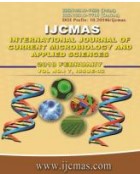


 National Academy of Agricultural Sciences (NAAS)
National Academy of Agricultural Sciences (NAAS)

|
PRINT ISSN : 2319-7692
Online ISSN : 2319-7706 Issues : 12 per year Publisher : Excellent Publishers Email : editorijcmas@gmail.com / submit@ijcmas.com Editor-in-chief: Dr.M.Prakash Index Copernicus ICV 2018: 95.39 NAAS RATING 2020: 5.38 |
Phytoplasmas are plant pathogenic prokaryotes lacking cell wall, inhabiting phloem sieve elements in infected plants and have a unique life cycle among pathogens as they invade organisms of two distinct kingdoms, namely Plantae (plants) and Animalia (insects) and replicate intracellularly in both of them. Effectors are proteins secreted by a microbial pathogen into a host cell to enhance colonization and facilitate multiplication of the pathogens. In plants these effectors unload from the phloem to access distant tissues and alter basic developmental processes. The effectors provide phytoplasmas with a fitness advantage by modulating their plant and insect hosts. Phytoplasmas have a functional Sec-dependent translocation pathway for the secretion of effectors. Fifty six (56) candidate effectors were identified and named as secreted AY-WB proteins (SAPs), 45 in OY, 41 in AUSGY, 13 in AP, 25 in MBSP. Among these effectors, only some have been functionally characterized like SAP 11 which enhance insect vector reproduction by manipulating plant development and defence hormone biosynthesis, SAP 54 which induces indeterminate leaf like flower development and discovery of SAP54 is novel as there is no pathogen effector identified tills date that interferes with floral development. Further research on phytoplasma effectors and dissection of plant defense responses that these effectors may target is expected to generate knowledge for the design of novel benign control strategies for phytoplasmas and hemipteran insects.
 |
 |
 |
 |
 |